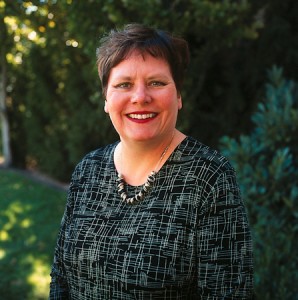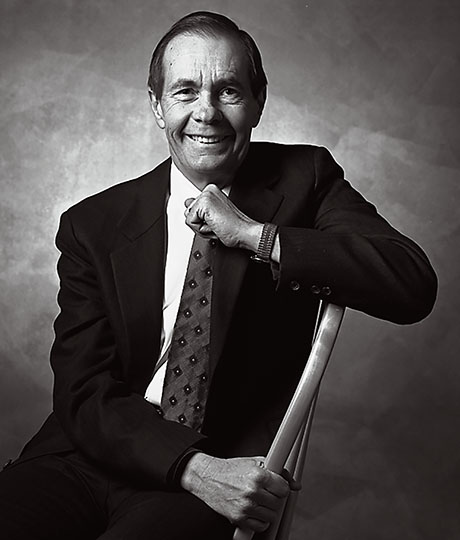By Mary Williams, ’71
In a revelation given through the Prophet Joseph Smith to David Whitmer, we are told that eternal life is “the greatest of all the gifts of God” (D&C 14:7). When we understand that the entire work and glory of the Savior is to “bring to pass the immortality and eternal life of man” (Moses 1:39), a most significant question for us is, How do we obtain eternal life? The Savior provides the key in His great intercessory prayer: “And this is life eternal, that they might know thee the only true God, and Jesus Christ, whom thou hast sent” (John 17:3). The key to eternal life, then, is to know God the Father and Jesus Christ.
I believe that the “knowing” spoken of by the Savior is far above a knowing of facts, techniques, or theories. To know Jesus Christ requires a different kind of knowledge. Knowing Him is more than knowing His doctrine and certainly more than professing His doctrine. The New Testament tells of many who spent time with Jesus, heard His words, and even saw His miracles but, sadly, never knew Him. Knowing Him in the way He has counseled and pled with us to know Him requires everything we are and, in the end, changes our beings forever.
Elder Neal A. Maxwell of the Quorum of the Twelve Apostles says, “The more we know of Jesus, the more we will love Him. The more we know of Jesus, the more we will trust Him. The more we know of Jesus, the more we will want to be like Him and to be with Him by becoming the manner of men and women that He wishes us to be” (“Plow in Hope,” Ensign, May 2001, p. 60).
How, then, do we come to know Him?
The Savior will be our tutor and trainer in learning to know Him and be as He is. He is there to direct each of us if we will listen to His voice through the Holy Ghost and heed His counsel. I have come to know that this direction and counsel are deeply personal and demonstrate not only the Savior’s love for us but also His knowledge of us.
One of the most profound ways to follow the Savior is through serving others. As we serve others as He served, we come to know Him with great power. The Savior has provided us with many examples of compassion and concern. We see Him with the crippled man at the pool of Bethesda and hear Him say, “Rise, take up thy bed, and walk” (John 5:8). We hear Him ask His followers on the American continent, “Have ye any that are sick among you? . . . Bring them hither and I will heal them, for I have compassion upon you” (3 Ne. 17:7). As we serve we come to know Jesus more, and as Elder Maxwell has said, “To know Jesus more and more is to experience His attributes. . . . We truly accelerate knowing Him, as we become more like Him by means of our imperfect adulation” (The Promise of Discipleship [Salt Lake City: Deseret Book, 2001], p. 20).
Often we have so many opportunities to serve His children that we become overwhelmed at where to start, and so we do nothing. But if we will follow the counsel of Elder Henry B. Eyring of the Quorum of the Twelve Apostles and say in prayer, “‘Please tell me who needs me,’ answers will come. A face or a name will come into our minds. Or we may have a chance meeting that we feel isn’t chance. In those moments we will feel the love of the Savior for them and for us. As you watch over His sheep, your love for Him will grow. And that will increase your confidence and your courage” (“Watch With Me,” Ensign, May 2001, p. 40). The very details of their needs will be revealed to us. Elder Eyring explains it this way: “[The Savior] watches with us. He who sees all things, whose love is endless, and who never sleeps—He watches with us. He knows what the sheep need at every moment. By the power of the Holy Ghost, He can tell us and send us to them” (p. 39).
One of the most powerful insights I have had in my life is the realization that hearing His voice through the Holy Ghost and acting on the promptings are spiritually synergistic. As we hear and then do, we become capable of hearing a more refined signal than we have been able to hear before. The result of this upward spiritual spiral is increased auditory and functional capacity as we are taught how the Savior thinks, teaches, and acts. Through these kindergartens for our character, we learn how to be like Him.
An incident from my own life demonstrates this principle. One day I returned home from work. It had been a particularly difficult day, and I felt the burdens of the world. I was extremely fatigued, emotionally and physically. I had not been home long when I felt impressed by the still, small voice that I should go to the home of an inactive woman I had visit taught for a number of years. Many times I would try to visit her, but I was often unsuccessful in my attempts. On the few occasions when I was able to visit her, I came to know that she had a strong belief in Heavenly Father but had been offended many years previously and had difficulty with some of the teachings of the Church. When I felt impressed to go to her home, my first thought was, Not tonight. I am so tired. It can wait until tomorrow. But as is often the case, the impressions continued to come more strongly. Finally, I drove to her home, thinking, Why am I doing this? She probably won’t answer the door. I knocked, and soon the door opened. I could tell she was extremely distraught. She invited me in. Her first words were, “How did you know to come?” I responded that the promptings had been there.
For the next several hours we talked about her desperate family situation, her suicidal feelings, and her sense of hopelessness. I prayed that I might know how to comfort her as the Savior would. The words came, the promptings came, and I began to see a calm come to her. That night forever changed my relationship with her and forever changed my relationship with the Savior. Now I never have trouble getting into her home or making contact with her. I no longer question the Spirit’s promptings when they come, for I recognize them more clearly.
What did I learn about the Savior that night? I learned that He loved this dear sister regardless of her current standing in the Church. I learned how He comforted as I listened to the promptings I received as I talked with her. Did I know my Savior better after that night? Yes! I learned that the Savior trusted me enough to let me participate as He met her needs. I was part of how He “succored” her (see Mosiah 4:16). It was through the listening and the acting that I was able to participate in the Savior’s plan to bless another person’s life. I knew with great assurance that the Savior loves people who are struggling. And it made it easier to believe that He loves me when I struggle as well.
Through the process of our listening and doing, the Lord comes to know us. It is true He knows everything there is to know about us and still loves us. Nothing we do or fail to do will ever diminish His love for us. But through our active listening and faithful doing, we demonstrate to Him that He can trust us, and we are known by Him in an entirely different way. We are known by Him in friendship and in trust. We are His (see D&C 84:77).
I testify that we come to know Him as we hear His voice and follow Him. As King Benjamin said, “For how knoweth a man the master whom he has not served, and who is a stranger unto him, and is far from the thoughts and intents of his heart?” (Mosiah 5:13).
My prayer is that we may all know the Savior and be known of Him; that we might engage in the powerful process of hearing the Shepherd’s voice, following Him, and becoming like Him; that we be counted among His friends and enjoy a life like His—eternal life, the greatest of all the gifts of God.
Mary Williams is an associate professor of nursing. This article is adapted from a devotional address given July 17, 2001.
web: The complete text of this speech, originally titled “To Know and to Be Known of God,” is available online at the Speeches Web site speeches.byu.edu.
HEROES AND ROLE MODELS
With rare exceptions, no one cares more about your welfare than do your parents. Listen to them with confidence. But also listen to prophets, seers, and revelators whose counsel is motivated only by their desire to teach truth and by their belief in your divine potential. . . . If we don’t listen to the prophet, we might as well not have one.
Satan tries to confuse us about voices and heroes and role models. He encourages us to worship the bright and beautiful—regardless of their values or motives. . . . Just because someone can shoot a ball through a hoop or record a hit song or launch a billion-dollar IPO doesn’t mean that he or she deserves our respect, and it certainly doesn’t mean their lives should be patterns for our lives. Jesus Christ gave us the one sure pattern. If we are wise, we will follow only those who lead us closer to Him. That is the litmus test for evaluating anyone’s motives.
—Sheri L. Dew, “Living on the Lord’s Side of the Line,” Devotional Address, March 21, 2000
web: The full text of this speech is available at speeches.byu.edu/










